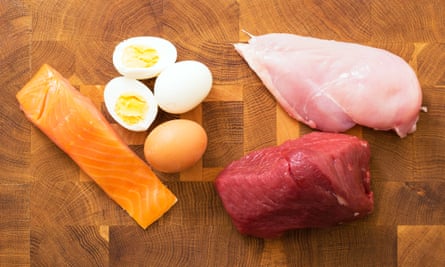The UK’s rocketing demand for high-protein products is being fuelled by consumers buying foods unlikely to deliver the benefits they are seeking, experts have said.
Weetabix, Shreddies, Mars, Snickers and Batchelors Cup a Soup were among the brands that launched enhanced protein versions this year as the trend hit the mainstream.
Many supermarkets have introduced dedicated sections for higher-protein products and, according to Euromonitor, the market for sports protein products alone – which excludes most of the mainstream brands – is expected to hit £413m this year and almost £750m (in today’s money) in five years’ time.
But experts have warned that consumers, particularly gym-goers, are falling victim to clever marketing.

Anna Daniels, a dietitian and British Dietetic Association spokeswoman, said: “People have a misconception they do need more protein whereas actually the majority of us are getting adequate protein – our requirements are quite low. If you’re an athlete you will have higher requirements but you can still get it from eggs, yoghurt, meat. The majority of us who go to the gym for an hour a couple of times a week, there’s no need to be having additional protein we [already] get from a balanced healthy diet.”
Public Health England (PHE) guidelines suggest a protein intake for 19- to 64-year-olds of 55.5g for men and 45g for women, although experts say this will vary according to weight (the US Institute of Medicine stipulates a minimum of 0.8g per kg of body weight per day).
The PHE guidelines equate to getting approximately 11% of the recommended number of calories from protein, whereas according to the National Diet and Nutrition survey, the actual figure for adults is 17% to 18%.
Dr Alison Tedstone, PHE chief nutritionist, said: “The majority of people are consuming much more than the recommended daily allowance of protein through their everyday diet. So even if you hit the gym regularly, spending money on protein supplements is unlikely to bring any additional benefit.”
According to the Euromonitor figures, which cover ready-to-drink beverages, protein powders and protein bars with a minimum of 20g of protein, the sports nutrition market has grown by about 160% since 2011. Another market analyst, Nielsen, said there was a 63% rise in sales of protein bars in 2015, compared with the previous 12 months, while Mintel figures, published in August, said there had been 40% more launches of high-protein products this year compared with 2015.
Tom Sanders, professor emeritus of nutrition and dietetics at King’s College London, said people were being taken in by “nutri-babble”. “There’s been a lot of hype in gyms pushing high-protein shakes, there’s also a need to get rid of a waste product from the dairy industry, which is whey protein,” he said. “It’s a lot of crap, a way of selling a cheap product at a high price.”
Danny Commane, a lecturer in nutritional science at the University of Reading, said while there was some evidence suggesting that eating more protein could help increase muscle mass, the fact that people were already eating so much more than they needed made supplements unnecessary. He has worked with the successful GB rowing team, some of whom he said do not take protein supplements despite consuming 6,000 calories a day.
“It’s clever marketing,” said Commane. “Unless you’re doing extreme exercise or pursuing extreme lifestyle goals, you don’t need extra protein.”
As excess protein is excreted through urine, people who are consuming too much are effectively flushing their money down the toilet, according to the experts.
This also makes it unlikely that they are doing themselves harm – unless they already have kidney disease – but it could be problematic if high protein consumption replaces other foods important for good health such as fruit, vegetables and wholegrains, they said. “A lot of the products are high in sugar, low in fibre, they’re not healthy choices for consumers,” said Daniels.
Darren Beale – founder of musclefood.com, which specialises in lean meats but also sells high-protein pizzas, chocolate and even beer – said gym-goers increasingly want to control what they put in their body.
“Are people eating too much protein? Depends on their health or fitness goal,” he said. “There’s research showing that a diet high in protein can help build muscle mass, but there has to be a macro balance with carbs and fat. Our entire aim is to provide products which make it easier for customers to stick to their healthy eating plan.”
None of the manufacturers of products mentioned in the article addressed the issue of the high amount of protein already in UK diets when contacted by the Guardian.
A Food and Drink Federation spokesman said: “Food manufacturers are responding to an increasing demand from consumers for high-protein food and drinks, which can be consumed as part of a healthy lifestyle. There is also some evidence that foods high in proteins can help us feel full for longer – increasing satiety and aiding appetite control – and this may be helpful for people trying to balance their energy intake. Protein content will always be clearly labelled, usually alongside how much of an adult’s recommended intake this represents, to help consumers make informed choices.”
A Mars spokeswoman said its bars were designed to be “a post-workout treat, to be enjoyed as part of a balanced diet”. Weetabix said protein at breakfast “helps regulate appetite and daily food intake”.
